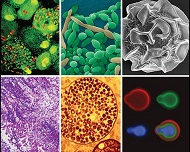WHO Issues Warning About Fungal Pathogens That Are A Global Health Threat Including Candida Auris, Mucorales And Many Others!
Source: Medical News - Fungal Pathogens Oct 27, 2022 3 years, 1 month, 3 weeks, 1 day, 2 hours, 3 minutes ago
The WHO or World Health Organization has issued a public warning about a list of fungal pathogens that are emerging to be a global health threat including many that are developing drug resistance.

For the first time, the WHO drew up a list of identified fungal pathogens that they claim are posing the greatest threat to human health with many already becoming increasingly drug resistant and even becoming to become widespread.
The published list divides the fungal pathogens into three categories based on their potential impact and data on their resistance risk: critical, high and medium priority.
The main critical group includes Candida auris, which is highly drug resistant and has caused a number of outbreaks in hospitals worldwide, as well as Cryptococcus neoformans, Aspergillus fumigatus, and Candida albicans.
As early as June 2019, Thailand
Medical News had previously issued warnings about Candida auris.
https://www.thailandmedical.news/news/alert:-the-new-resistant-fungal-threat--to-asia,-candida-auris
https://www.thailandmedical.news/news/healthcare-professionals-worried-about-new-dangerous-fungal-infection,-candida-auris
The fungi candida albicans which is a common yeast have been found to be able to also cause brain infections and also impair memory.
https://www.thailandmedical.news/news/common-yeast-and-other-fungi-cause-brain-infections-and-also-impair-memory
In the high group, a number other fungi from the Candida family are also included such as Candida glabrata, Candida parapsilosis and Candida tropicalis along with others such as Mucorales ie a group containing the fungi that causes mucormycosis or "black fungus" infection that has been found in many seriously ill covid patients especially in countries like India, Iran, Turkey and South Africa.
The fungi listed in the medium group includes number of other fungi such as Coccidioides spp, Cryptococcus gattii and Pneumocystis jirovecii.
This is the first list of fungal pathogens draw up by the UN health body that also has similar lists for viruses and bacteria.
The World Health Organization said fungal infections and their increasing resistance to treatment were a growing risk. However, a historic lack of focus on the danger meant there were huge gaps in knowledge, as well as a lack of surveillance, treatments and diagnostics.
At present, The WHO said that was hard to even to estimate the scale of the threat because of the lack of data.
The WHO is calling for a major effort from governments and researchers to strengthen the response to the 19 fungi on the list.
Dr Hanan Balkhy, WHO Assistant Director-General for antimicrobial resistance told media, "Emerging from the shadows of the
bacterial antimicrobial resistance pandemic, fungal infections are growing, and are ever more resistant to treatments, becoming a public health concern worldwide."
It was reported that fungal infections often strike individuals who are already severely ill, like cancer or tuberculosis patients, and rates jumped among hospitalized COVID-19 patients during the pandemic.
More interestingly, Thailand
Medical News would like to highlight that with the ongoing COVID-19 pandemic, SARS-CoV-2 induced immune dysfunctions and also immunodeficiency can cause many who were exposed to the virus to develop secondary opportunistic pathogen infections including those involving fungi.
https://www.thailandmedical.news/news/hypothesis-sars-cov-2-variants-worse-than-hiv,-disrupting-immune-system-and-giving-rise-to-dangerous-opportunistic-infections-including-candida-auris
https://www.thailandmedical.news/news/why-is-no-one-warning-the-masses-that-the-sars-cov-2-spike-proteins-are-causing-major-immunodeficiency-issues-in-all-infected-individuals
The WHO reported that at present, only four types of fungal treatments exist, with very few new options in the development pipeline. Climate change also means that the incidence and geographic range of the pathogens is expanding, WHO said, while resistance is in part being driven by the over-use of antifungals in agriculture.
https://www.thailandmedical.news/news/experts-warn-that-climate-change-would-unlock-new-microbes-and-increase-heat-related-deaths
The Who stressed the need for more evidence to inform the response to this growing threat and to better understand the burden of both of disease and antifungal resistance. The WHO list and report also highlights the urgent need for coordinated action to address the impact of antifungal use on resistance across the One Health spectrum and calls for expanding equitable access to quality diagnostics and treatments.
Dr Balkhy added, “We need more data and evidence on fungal infections and antifungal resistance to inform and improve response to these priority fungal pathogens.”
The WHO list and report underscores strategies for policymakers, public health professionals and other stakeholders. The strategies proposed in the report are collectively aimed at generating evidence and improving response to these fungal priority pathogens including preventing the development of antifungal drug resistance. The primary recommended actions are focused on: (1) strengthening laboratory capacity and surveillance; (2) sustaining investments in research, development, and innovation; and (3) enhancing public health interventions for prevention and control.
Dr Balkhy said, “Countries are encouraged to follow a stepwise approach, starting with strengthening their fungal disease laboratory and surveillance capacities, and ensuring equitable access to existing quality therapeutics and diagnostics, globally.”
Interestingly, resistance to antifungal medicines is partly driven by inappropriate antifungal use across the One Health spectrum. For example, injudicious use of antifungals in agriculture was linked to the rising rates of azole-resistant Aspergillus fumigatus infections.
Antifungals and antibiotics are also extensively over used in the meat, poultry and seafood industry and also in the food processing industry.
The list and report also call for fostering WHO’s collaborative effort with the Quadripartite organizations and other partners, to address the impact of antifungal use on resistance across the One Health spectrum.
For more on
Fungal Pathogens, keep on logging to Thailand
Medical News.
